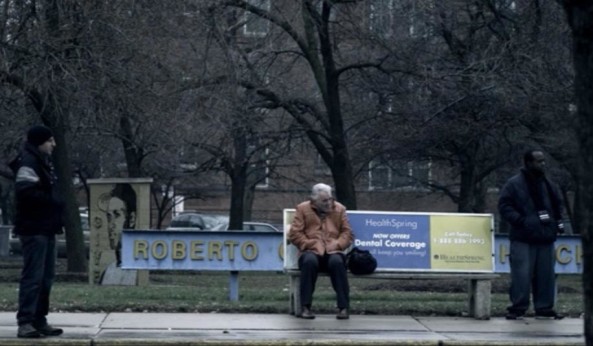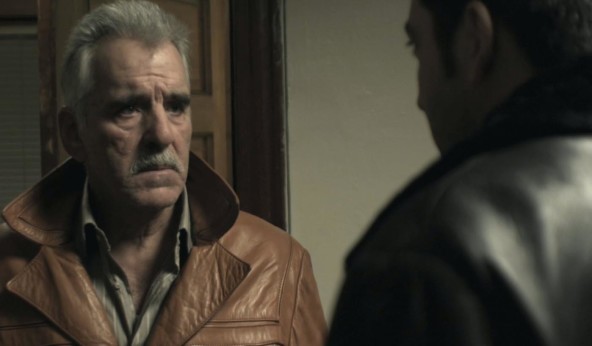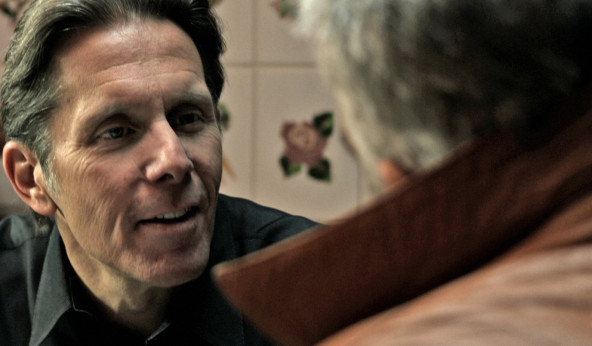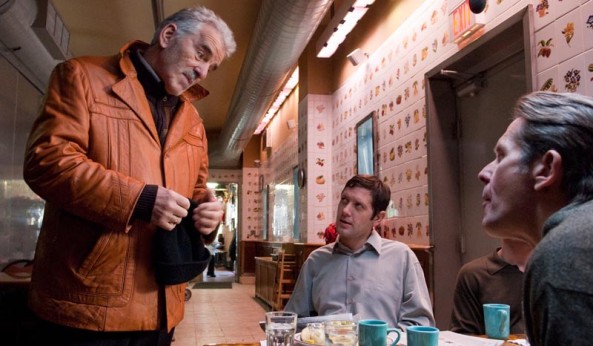The Last Rites of Joe May
Dir. Joe Maggio (2011 107 min)
Dennis Farina, Matt Decaro, Meredith Droeger, Jamie Ann Allman
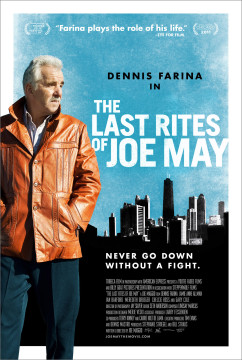
Showcasing a tour-de-force performance from veteran Dennis Farina, THE LAST RITES OF JOE MAY chronicles the final days of an aging, short money hustler clinging to the belief that he’s one scam away from the glorious destiny he’s always deserved. Now in his sixties, his health failing and resources dwindling, Joe is presented with one last shot at redemption in the eyes of a community that’s all but left him for dead.
Long Synopsis:
Despite all evidence to the contrary, aging short-money hustler Joe May (Dennis Farina) always believed he had a glorious future ahead of him. Now in his sixties, Joe is released from the hospital after a long battle with pneumonia and forced to confront the harsh reality of his legacy: everyone he knew had assumed he was dead, and life had gone on around him without missing a beat. Returning to his old neighborhood in Chicago’s “Patch” district, he finds his car gone, all his worldly possessions pawned by his landlord, and the apartment he’s lived in his entire adult life rented out to a single mother named Jenny and her eight year-old daughter Angelina . After a rough night’s sleep outdoors, Joe reluctantly moves in with the new tenants of his home – at least until he is able to get back on his feet.
Even as Joe doggedly pursues his comeback, he finds the odds stacked drastically against him. He gets no respect from his old supplier, his best friend and partner in crime has moved into an assisted living facility, and even Joe’s prized pigeon coops have fallen into disrepair. Throughout this ordeal, Joe’s one lifeline is his burgeoning friendship with his co-tenants. So when things turn ugly between Jenny and her boyfriend – a crooked detective with a penchant for domestic violence – Joe is determined to take a stand for his unlikely new family, and perhaps take one last shot at redefining his legacy.
DIRECTOR’S STATEMENT FROM JOE MAGGIO
I can’t say specifically what inspired THE LAST RITES OF JOE MAY, but that being said, there are three things I know for sure.
First, I began thinking somewhat vaguely about a Joe May kind of character shortly after breaking up with a girl who, in one especially painful moment of the whole extrication process, announced quite coolly and confidently that I would very likely die a broken and lonely old man. This was nearly twenty years prior to writing the screenplay for THE LAST RITES OF JOE MAY, but her words stuck with me, imbedded somewhere in my prefrontal cortex, and over the years I would have many painful imaginings about how her awful prophecy might one day come true, quite a few of which made it onto the screen in Joe’s words and deeds.
I am also a big Vittorio De Sica fan and I began writing more specific notes for THE LAST RITES OF JOE MAY shortly after seeing UMBERTO D for the first time. I’d already made three feature films, but was struggling mightily to pay the rent and keep myself fed. The hero of De Sica’s film had worked hard his entire life and now, in his retirement, when all he wanted was a warm place to sleep, a little food for himself and his dog, and perhaps a kind word now and then from an old acquaintance – somehow, even this was too much to ask for. During long bouts of self-pity, locked away in my apartment, skillfully avoiding the landlord, I found myself thinking of poor Umberto and how, like him, I seemed thoroughly ill-equipped to survive, let alone succeed.
Finally, and at the risk of confessing too much publicly, there is quite a lot of my maternal grandfather and his sons in Joe May. He exhibits the endless optimism in the face of overwhelming odds, the swagger, a few sartorial touches, and most importantly the strict adherence to a code of conduct which, just a generation ago, outlined in precise terms what it meant to be a man. You always pay your debts. You never let anyone know when you’re down and out and no matter how bad things get you keep your shoes shined, your pants pressed and your hair trimmed. If you can’t afford to leave a tip, don’t go into the bar. You wait your turn, with patience and fortitude, because better days will come, eventually. Joe’s trouble isn’t that he fails to live up to this code, it’s that the world has changed to such a degree that in obeying these rules Joe is, in a sense, holding devalued currency. In this way I suppose THE LAST RITES OF JOE MAY is an effort to redeem those men and their ideals, flawed though they may be. And Joe May is nothing if not flawed. I hope that you love him anyway.
DENNIS FARINA
Farina most recently appeared on the big screen in the critically acclaimed feature BOTTLE SHOCK alongside Alan Rickman, Chris Pine and Bill Pullman and as Cameron Diaz’ boss in the Fox comedy feature WHAT HAPPENS IN VEGAS, directed by Tom Vaughn. He is currently shooting the HBO series “Luck” opposite Dustin Hoffman and Nick Nolte. The series was created by David Milch (“Deadwood”) and the pilot was directed by Michael Mann, who is executive producing alongside Milch.
Farina is well remembered for his roles in memorable features such as Steven Soderbergh’s OUT OF SIGHT, the sly and sexy crime caper in which he played Marshall Sisco, the retired lawman father of Jennifer Lopez’s character. This was Farina’s second outing in an
Elmore Leonard best seller adaptation for Jersey Films, the previous one being GET SHORTY, directed by Barry Sonnenfeld and co-starring John Travolta, Rene Russo and Gene Hackman. Farina received an American Comedy Award for Funniest Supporting Male for his performance as Ray ‘Bones’ Barboni.
One of the most recognized character actors of our time, Farina has played everything from an army colonel in Steven Spielberg’s SAVING PRIVATE RYAN, to a Jewish diamond merchant opposite Brad Pitt and Benicio Del Toro in the darkly comedic crime drama SNATCH directed by Guy Ritchie, to a seat belt challenged hit man in Touchstone’s comedy BIG TROUBLE directed by his GET SHORTY director Barry Sonnenfeld, to an Irish mob boss in YOU KILL ME opposite Sir Ben Kingsley, Tea Leoni and Luke Wilson, to a wise-cracking news anchor with outrageous dating advice in SIDEWALKS OF NEW YORK directed by Ed Burns. He starred opposite Bette Midler in THAT OLD FEELING and played one of the most feared (and loved) gangsters of all time, Jimmy Serrano, in Martin Brest’s action-comedy MIDNIGHT RUN with Robert De Niro and Charles Grodin. Some of Farina’s other big screen credits include REINDEER GAMES, PAPARAZZI, THE MOD SQUAD, LITTLE BIG LEAGUE, STRIKING DISTANCE, ANOTHER STAKEOUT, and the Michael Mann films MANHUNTER and THIEF, the latter of which was Farina’s feature film debut.
On the small screen, Farina is widely recognized for his recent portrayal of Detective Joe Fontana on NBC’s epic series “Law and Order.” His other television series credits include NBC’s “In Laws,” CBS’s critically acclaimed “Buddy Faro,” created by Mark Frost (“Twin Peaks”), and NBC’s “Crime Story,” created by long-time collaborator Michael Mann. Farina starred in HBO’s miniseries, “Empire Falls,” directed by Fred Schepisi, which also starred Helen Hunt, Ed Harris, Paul Newman and Robin Wright Penn and won a Golden Globe Award for Best Mini-Series. He also appeared in the Emmy-nominated “The Drug Wars: Columbia.”
A veteran of the Chicago theater, Farina has appeared in Joseph Mantegna’s Bleacher Bums, A Prayer For My Daughter, directed by John Malkovich, A Class Three Trial in Yokohama directed by Donald Finn, The Time of Your Life directed by Donald Moffat, Heat directed by Roberta Custer, Streamers directed by Terry Kinney, Tracers directed by Gary Sinise (a JosephJefferson Award Winner for Best Ensemble) and others.
JAMIE ANNE ALLMAN
Jamie Anne Allman is an actress and occasional singer. At a very early age, Allman dreamed of being an actress. Pursuing her childhood dream, Allman moved from small town Kansas to Los Angeles. In a very short time, she has already proved herself to be a very powerful and versatile young actress. Allman has been acclaimed for both dramatic and comedic work in projects ranging from period to contemporary films, and network television to less publicized indie films. She achieved recognition for her film debut in THE NOTEBOOK starring Ryan Gosling and many television appearances including recurring on “The Shield,” “CSI,” and “The Closer” which are among just a few of her credits.
This spring, Jamie will be in a supporting role on AMC’s long-awaited murder mystery “The Killing,” which will get a two hour premiere on April 3, 2011. Off camera, Allman is known for her quirky sense of humor and familial devotion. In 2006, she married actor Marshall Allman and they happily reside in Los Angeles.
IAN BARFORD
Ian Barford has been a Steppenwolf Theatre Company ensemble member since 2007. This past summer Mr. Barford originated the role of Dr. Khassan Baiev in The Oath at the Weston Playhouse, based on Dr. Baiev’s autobiography of the same name. Credits at Steppenwolf include: Endgame, Up, Art, August: Osage County (also Broadway and London’s National Theatre), The Crucible, Betrayal, Love Song, Lost Land, Three Days of Rain, The Berlin Circle, The Libertine, As I Lay Dying, Time of My Life, The Rise and Fall of Little Voice, and others. Additional Chicago credits include: All the Rage and Design for Living (Goodman Theatre); Othello (Chicago Shakespeare Theatre); and Mad Forest (Remains Theatre). In Los Angeles: The Weir, God’s Man in Texas and Take Me Out (Geffen Playhouse); and Dead End (Ahmanson). Film and TV credits include: ROAD TO PERDITION, 13 GOING ON 30, “The Beast,” “Medium,” “Numbers,” “Without a Trace,” “Zoey 101” and many others.
MEREDITH DROEGER
Meredith Droeger began performing at the age of six and has several film, television and theatre credits. She played the role of Megan Crowley in the feature film EXTRAORDINARY MEASURES starring Harrison Ford, Brendan Fraser and Keri Russell. Other film credits include WEDNESDAY’S CHILD, LAC DU FLAMBEAU, and TRAIN TOWN (winner of Best Narrative Short in the Chicago Film Festival). She made her theatre stage debut with Chicago Shakespeare Theatre in Macbeth and had a co-star appearance on “The Beast” starring Patrick Swayze. In addition, Meredith has dozens of commercial and voiceover credits. Meredith was born and raised in Chicago and loves to play basketball, tennis and go bike riding. Her best friend is her older sister Abigail.
GARY COLE
Best known for his film roles in classic cult comedies such as OFFICE SPACE, PINEAPPLE EXPRESS, TALLADEGA NIGHTS: THE BALLAD OF RICKY BOBBY And DODGEBALL: A TRUE UNDERDOG STORY, Gary Cole is a veteran of both the screen and the stage. As an ensemble member of Steppenwolf Theater Company, Cole’s theater credits include August: Osage County, Collected Works of Billy the Kid, Speed the Plow, American Buffalo, and Flyovers and Balm in Gilead. Additional film credits include: AMERICAN PASTIME, BREACH, THE RING 2, CRAZY IN LOVE, WIN A DATE WITH TAD HAMILTON!, I SPY, ONE HOUR PHOTO, THE GIFT, A SIMPLE PLAN, KISS THE SKY, THE BRADY BUNCH MOVIE and Clint Eastwood’s IN THE LINE OF FIRE. Television credits include: “Midnight Caller,” “American Gothic,” “The West Wing,” “Arrested Development,” “Desperate Housewives,” “Chuck,” “The Cleaner,” “Entourage,” “Numb3rs,” “The Good Wife” and “The Good Guys.”
DIRECTOR – JOE MAGGIO
Joe Maggio is the award-winning writer/director of five and a half feature films: VIRGIL BLISS (2001); MILK + HONEY (2003); PAPER COVERS ROCK (2008); EUPHORIA (2009); BITTER FEAST (2010) and THE LAST RITES OF JOE MAY (2011). His work has screened widely at film festivals including Sundance, Slamdance, SXSW, LAFF, Tribeca, Seattle and Chicago. In 2002 he was nominated for two Independent Spirit Awards and his films have been distributed domestically and internationally through First Run Features, Wellspring/Weinstein Co., IFC Films and MPI Media. He lives in Brooklyn with his wife and daughter.
PRODUCER – BILL STRAUS
After working on college classmate John Singleton’s Boyz N’ the Hood, Straus sold hisoriginal screenplay THE CLOWN PRINCE to Sony Pictures. At 23, he was attached to direct thefilm which had a flickering greenlight, but never quite got made. When the studio finally put theproject in turnaround, Bill took his earnings and spent eighteen months travelling through thethird world with a backpack.
After a few years back home in Brooklyn, New York, Straus decided to return to USC’sPeter Stark Producing Program to get his Master’s degree. Straus’ summer internship at NewLine Cinema turned into a story department position and he eventually worked his way up to the executive ranks. After leaving the studio, Straus set up his own shingle with a first-look dealat Circle of Confusion. His first film, THE MAN, starring Sam Jackson and Eugene Levy, wasreleased in September 2005. He also produced WEAPONS (Nick Cannon, Paul Dano) and RED (Brian Cox), Sundance Film Festival selections in 2007 and 2008 respectively. Straus has a number of other projects in various stages of packaging and development. Chief among them is STRAIGHT OUTTA COMPTON, a biopic of NWA at New Line.
Bill lives in New York with his wife Noriko and his 2-year-old daughter Junie.
PRODUCER – STEPHANIE STRIEGEL
Stephanie Striegel, a native of Hollywood, California began her career working with Tim Burton’s production company and on the films, ED WOOD and THE NIGHTMARE BEFORE CHRISTMAS. In 1994, Stephanie joined TriStar Pictures where she served as Executive Assistant to Stacey Snider (who is now CEO of DreamWorks), working on projects that included JERRY MCGUIRE, MY BEST FRIEND’S WEDDING, JUMANJI, and LEGENDS OF THE FALL.
A year later she was offered a position at New Line Cinema working in development for Lynn Harris, under Michael De Luca, and later Toby Emmerich. She worked on BOOGIE NIGHTS, LIVING OUT LOUD, BLOW, and BLADE. While Story Editor she also served as an executive producer on the award winning boxing film, PRICE OF GLORY, starring Jimmy Smits. Other projects she oversaw as a Production Executive include HOW TO DEAL, starring Mandy Moore, and THE NUMBER 23, starring Jim Carrey.
At the end of 2002, Striegel joined Spyglass Entertainment as Vice President of Production reporting directly to President, Jonathan Glickman. She immediately went into production on Universal Studios’ CONNIE AND CARLA, written by and starring Nia Vardalos, Toni Collette, and David Duchovney. In addition, she oversaw a slate of projects that included
INTERVIEW WITH DENNIS FARINA
Dennis Farina has seen his share of “Joe Mays” in his life, especially growing up in Chicago. These are the kind of guys who bounce around the neighborhood, always looking for a new hustle, always a move away from hitting the big time. And almost always, they wind up cold and broke, which is exactly where Joe Maggio’s THE LAST RITES OF JOE MAY begins.
The film opens as Joe May is coming off a bout of pneumonia that had him hospitalized for a couple months, and left the neighborhood thinking he was dead. In two months, Joe May lost his car, his apartment and most of all, his way. But guys like Joe May are always “looking for the angle,” as Farina says. So Joe May puts on his tan leather jacket, and begins working the streets. For all his efforts to keep up appearances— the big tip at the bar, the rented limousine, the more Joe realizes his life has passed him by. His fellow hustler friend is in a retirement home. His “pet” pigeons have flown their coop. The only gig Joe can find is unloading a 50lb side of grass-fed beef, which proves a lot tougher than unloading “fugazi” watches and electronics.
Joe May gets an unlikely and unconventional shot at redemption when he meets the new tenants living in his apartment. A wayward single mother and her precocious daughter enlighten him to a small bedroom and a last chance at greatness.
Farina embodies Joe May with all the humor and vitality from his best known tough-guy roles in films like GET SHORTY, SNATCH and OUT OF SIGHT, within a character who is struggling to hold on to something that has long passed him by. With each new angle he tries to pursue, Joe May’s cracks begin to show. In a performance that is both raw and vulnerable, Farina isn’t afraid to come out swinging and fall down and get back up swinging and fall down again. It’s a film and a character that keeps you guessing, because as Farina says, “Joe May is a survivor.”
How did you get involved with this film?
I have a little company called, You’re Faded Films. Bill Straus brought the project to Stephanie Striegel who was working for us. When they showed it to me—I liked it immediately. It was originally set in New York, but I said, “Geez, I’d really like to do a picture in Chicago, I haven’t worked there in a while. Is there any way we can move the location from NY to Chicago?” So we sat down with Joe and talked about it—he came to Chicago, looked over the neighborhoods, got some location people to take him around the city, picked out some neighborhoods to work in, and it all worked out. My biggest concern, believe it or not, it’s a small thing, but I wasn’t aware of how many pigeon coops were in Chicago... because pigeon coops are normally associated with the east coast—and that’s the only thing I’m concerned about—do we have pigeon coops. Though it’s illegal to have pigeon coops in Chicago—there are indeed a lot of them. So that was what I thought was going to be a concern, and was not.
Your character is so well defined, and the story just starts to slowly reveal itself. Can you talk about why you wanted to take on a character like this?
For me, it was all in the writing and in the circumstances. I think a lot of people through their lifetimes have met guys like Joe May. Guys who are just kind of surviving and always looking for that one big score, or that one big idea that they’re going to have, that’s going to catch on and going to make them a lot of money. Joe’s a survivor, is what he is, in his world... That’s always been interesting to me because I’ve known people like that all of my life. When I was a kid, there were a million guys where I came from that had a watch, a radio, raincoats, gloves, anything you wanted and they felt that if they made $20 or $30 dollars a day, they were getting one over, and they went marching to the tune of the convention that they were surviving. I he was an interesting guy.
There’s definitely a status thing with him—he’s keeping up appearances.
I think he’s very image conscious, that’s for sure. He’s had this horrible bout in the hospital and he comes up, but everything is stripped away from him. But I think he’ll be damned if he’s not going to leave a $30 tip on a $10 dollar cab. He wants to keep that image up—not only for himself, but for everyone around him. He is BS’ing everybody, is what he’s doing. He needs that. He holds on to that, because if he gives that up, I think it’s over for him. He can’t be Joe May any longer. He’s a fish out of water, is what he is.
Even though he’s a pretty virile guy, he’s viewed as a cast off. If he wanted to, he could have an affair with Jenny.
We went round and round about it. We thought about that, we discussed it and thought, does he really do this? And I think what our conclusion was, is that no matter what he is, or what people think he is, he fancies himself as a gentleman, and he doesn’t think it would be proper for him to be sleeping with this woman in the same apartment with her little girl. He wouldn’t cross that line.
It’s sort of a story about redemption in some ways too—in terms of the relationship he has with his own son. He redeems himself a bit by helping Jenny and her daughter out.
I think it starts out from simply selfish motives—he can live there and it’s only going to cost him so much—he feels he can always hustle that kind of money. But then I think it evolves into something else. I think for him it evolves into a noble gesture. And I think part of that noble gesture is not to get involved with Jenny.
Talk about his relationship with Jenny’s daughter, Angelina. It’s such a great dynamic—he’s showing her the ropes in such an unconventional way.
I think maybe he’s trying to recapture what he should have done, or maybe what he wanted to do with his own kid. Maybe if he would have said and done the same things with his own kid as he’s saying and doing with Jenny’s daughter, things would have been a little different for him. But I think what happened, was that the selfish part of him became such a problem, because he thought as long as he brought home enough money to pay the rent and kept his wife happy, it’d be ok. And to do that—he was out doing whatever he wanted to do. He lived the life he wanted to lead at the expense of the relationship with his wife and child. And now maybe finally, he may say, well—with this little girl, I’m going to teach her what life is. Some of it is very harsh, rude and crude—he tells you, “One day you wake up you’re going to be in a crapper.” I don’t know if that’s the right thing to be telling a little girl. But however, it’s his way of being as brutally honest as he can, in a way protecting her and teaching her of what’s to come in life. I mean, he definitely has his own way of doing things, and not all of them are right.
I loved him carrying around the grass fed beef around Chicago.
He’s surprised when he goes to get it because he’s thinking, well, I was always good with electronics, I can sell you watches and things like that, but what am I going to do with this 40-50lb piece of meat. I think that’s when his world takes a bit of a turn. He realizes he’s out of his element—if this is what he’s got to do, and then maybe it’s all over for him.
His friend, old partner in crime, is in a senior citizens home and has resigned himself to living out his life there. But your character isn’t ready for that.
I think Chelcie Ross’ character, Billy, realized—and maybe in a kind of perverted way— that, “Wait a minute, I could probably live in a senior citizens home, have the government pay for it, maybe get some social security or disability, pick up a couple bucks a day playing chess with these guys, and be warm in the winter.” He’s not out hustling any more. Maybe his intentions weren’t the purest, but they certainly suited his needs. Joe May hasn’t made that turn—he figures that’s for suckers. That’s why he asks “What do you have going on in there?”—because he’s thinking that there’s something going on in there that he can try and get in on. Joe’s convinced he has to have something going on at the senior home. He can’t accept what Billy did. He just can’t accept that. I know guys like that too. Right or wrong, those are their convictions. They’re always looking for an angle.
The relationship between Gary’s character and yours is great too, because you have to show him a sign of respect, and there’s probably a part of your character that wants to punch him.
I think he does, again, I think it’s the era that he’s living in now as opposed to the era he was brought up in. He keeps on, “You’re father and I, you’re father and I”—well those were different eras. And things have changed, even in that world they’ve changed—everything has changed except for Joe May.
Right, which is the case I think, for a lot of people when you hit a point in your life.
I can tell you, I’m 68, yeah—there are a lot of things going on that I just don’t understand. And it’s funny, I think maybe when you’re Joe May, your world just get smaller and smaller— and you keep gravitating to people who think like you, or are like you because you don’t understand, or can’t accept what else is going on in the world.
There’s that great moment that Gary Cole has at the end—he can’t believe it was Joe May that did this.
I don’t know if Joe was thinking that at the time. But if he’s always playing the angles, he may have gotten it in his head, that when they see this, they’re not going to believe that I did this and that I trumped everybody.
You root for him in the end; you want to see him win.
Well, in his world I think he won. That’s his redemption. That he saved this little girl. And her mother—he got them way from there. And he got his revenge. And at the end he’s the headliner.
Talk about working on the film—how long was the shoot, and how did you get it made?
We did it in about four weeks and we got it made because we pitched it to certain people over at Steppenwolf Films and they wanted to get into movie making and thought this might be in their wheelhouse. We started talking to them, and the rest came from private financing.
It’s funny that they’re involved, because it almost has the tone of a really great play, and the relationships are so intimate.
The film is kind of gritty, and Steppenwolf is kind of famous for gritty new kind of stuff. It was right in their wheelhouse and they were great. They’re wonderful people, and they couldn’t have been any nicer.
Talk about Joe Maggio as a filmmaker. What does he bring?
Well, I’d never worked with him before but I’d watched a couple of his movies. But when I met him, he came to Chicago, we hit it off immediately. We had, I would say 95% of the same ideas and the same attitude towards the character. We were pretty much on track the whole time. I can’t remember any real specific areas where we disagreed entirely. I think one area was the phone call that I make to the police station; we did it a bunch of different ways, but that was the only area that I kind of remember where we have a different idea of where we wanted to approach it. The rest of it, we were pretty much on board from the beginning.
Did you work on the script at all with Joe Maggio?
Joe and I, by necessity, had to change some stuff because of the location change. And then, he and I talked about local talk—how Chicagoans would talk as opposed to New Yorkers. And there were a couple of other references to neighborhoods, how you tell the streets downtown, that kind of language.
Talk about the cast.
Jamie was just wonderful. My pal, Gary Cole, we asked him to come in and do a couple of days and he was very accommodating. Chelcie has been an actor for years and years, around the Chicago area, and in many movies—he’s great.
You guys have made a film of something reminiscent of the 1970s movies, a character driven— unexpected story.
Joe had mentioned to me, he said, keep in mind the movie The Friends of Eddie Coyle, a Robert Mitchum movie—one of my favorite movies. It’s not the same character, but it’s the same world. And he wanted to keep that in mind. He wanted to have that in his head as a director, and I was very familiar with the picture, so I understood what he was talking about.
It must be a personal thrill to bring this film to Chicago.
Oh yeah, it was great, I still live in Chicago and it was fun to be in some of the old neighborhoods that I knew as a child and from working around there. We hope to bring more there. Joe and I are talking about doing another movie with Stephanie Streigel and Jay Silver, and also doing that in Chicago. We hope we can pull that one off too. It’s the best big city in the world. Of course I’m a little prejudice, but I love it.
What do you hope audiences draw from this film when they see it?
Well, we always, from the beginning, wanted it to be entertaining. It’s a rather serious movie, but there are some funny parts even though he doesn’t want to be funny. Those are the funniest guys, the guys who take themselves so seriously. I want audiences to be entertained, for an hour and a half, you can go and be entertained and get a message across, if there is a message, I don’t know that there is. I think the message is to Joe May, that his redemption is that he saved Jenny and little girl and sent them on their way.






